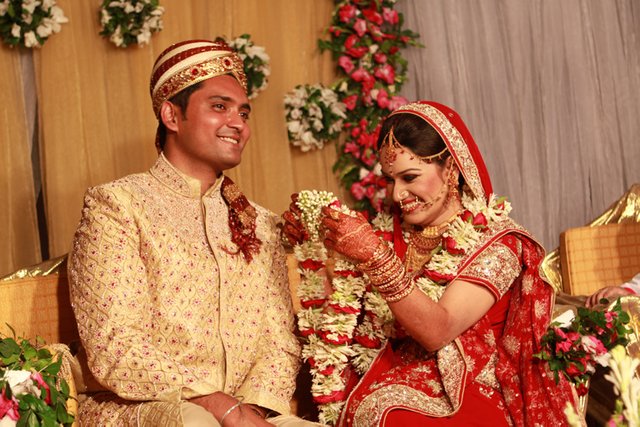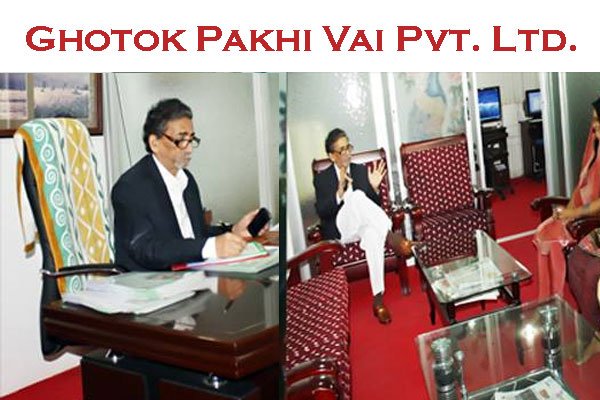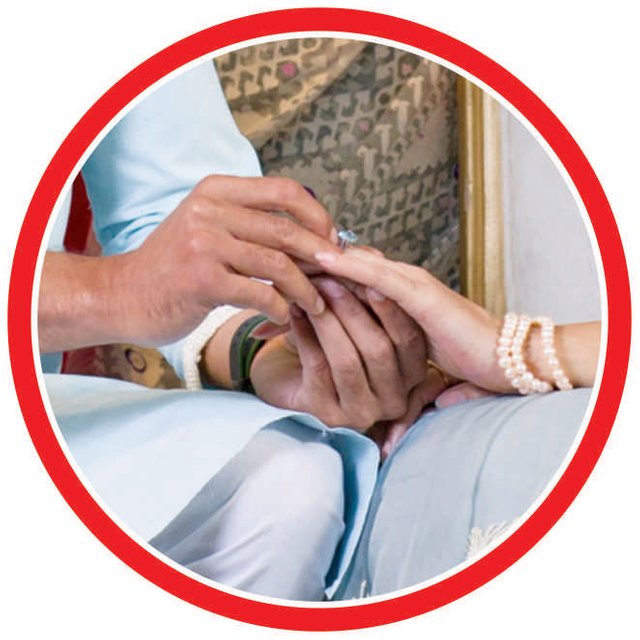A BANGLADESHI WEDDING REVIEW

Source
Now in Bangladesh, we are deep-rooted in tradition up till now here is variety seen in each dominion of life, initial from food and customs that are reproduced in Bangladeshi weddings. In our culture, wedding represents not just the blessed joining together of two persons, but the association of two families and stretched relatives as well. Their level of participation is so reflective that usually, the family agrees on the groom/fiancée.
Actually, even till a few years ago the bride and the groom saw each other for the first time on their marriage day. This tendency has altered in city zones, and in the contemporary day, the newer generation has a well say in selecting their life companion.
GHOTOK: THE MARRIAGE BROKER:

Source
The marriage broker continually played an influential role in scheduling the families of man and woman who are to be married. He is the guy who determinations probable confusions amid the families. He discloses particulars about the family antiquity. Educational credentials, occupation, business, social associations and so on are all shared.
PAKA KOTHA: BOY MEETS GIRL
This is the day the prospective bride is visited by the prospective groom's family. They are actually meeting her family to exchange pleasantries and in a way acquaint with each other before the final agreements are made. Traditionally groom and bride did not meet but it is now customary for them to meet as well, as the sides deduce and gauge each other. The girl is demurely attired in a sari or an ethnic suit. The boy likewise is casually dressed.
PANCHINI: ENGAGEMENT

Source
This is the official engagement. It is a tradition in Bangladesh and in the region to give two betel leaves and areca nuts to the guests at any auspicious occasion. Thus the name was derived from the servings. 'Paan' (betel leaf) being served with silver foil signals festivity and during such propitious occasions, it is also common to bring sweets. These gestures friendship and a heartening promise.
BANNS OF MARRIAGE: THE ANNOUNCEMENT
This is the ceremonial announcement of the intended marriage, also giving the opportunity for objection. In the old days, it was physically made within the community and it is now sometimes posted on social media. It allows people to be notified of the impending wedding dates so that the invitees keep themselves free. Secondly, it also introduces the wedding couple to the respected relatives and friends.
AI BURO BHAT: A SPECIAL FEAST
This refers to the last meal that the bride-to-be enjoys in her own home before she is married off. It calls for a mini-feast where the bride's extended family and close friends join in the celebrations and wish her all the best. The 'ai buro bhat' feast consists of typically Bengali fare such as rice, fish, luchis, vegetable preparations and sweets such as rice puddings and other traditional delicacies.
Conversely, sometimes close friends and relatives invite the would-be bride to their house for the feast and celebrate the forthcoming wedding where all their favourite dishes are prepared.
GANER JOLSHA: LIVE MUSIC
Musical soirées are a wonderful way to have a pre-wedding party. Love songs from the past and the present are sung by friends and family. Although these days professional singers are hired, but the general idea is and should be, to participate in the singsong experience. In recent years spoken parlour games are often played. This is popular and a cultural import from our neighboring nations. Dancing also revitalises the spirit of the party. This is a late night event where tea, savouries and sweets are served.
RUHI FISH: A WEDDING OBSERVANCE
It is our custom to send a pair of 'ruhi fish' to the bride's home on the morning of the holud ceremony. Fish in Bangladesh symbolise fertility, eternity, good fortune and wisdom. It is accepted and taken as a beautiful gesture of blessing. The pair of fish is dressed in fun and amusing attires, typically a sari and lungi, to add some humour to the presentation. The size of the fish is exhibited and paraded to show the breeding and generosity of the groom's family. It is also a time-honoured tradition to cook the fish for distribution amongst close relatives or eaten together with family.
GAYE HOLUD: PRE-WEDDING CEREMONY
This is a pre-wedding ceremony for both bride and groom. In the past it was a family affair where womenfolk would participate and men were not permitted in the rituals.
The brides got exfoliated with turmeric and other fragrant herbs as a pre-wedding beautification ceremony. Now, holud events are very elaborate with the bride's holud taking place the day before the grooms.
The trousseau of gifts and sweets are carried on this day. They are wrapped and packed beautifully making a clear statement about the theme of the wedding. The entire process is good fun.
Family and sometimes friends put in their share to make the presentations look magical. Clearly there is healthy competition of the two groups to out do each other with their personal styles. The observance of touching the turmeric and smearing it on the forehead is a ceremonial tradition. The brides are now seated before an assortment of finger foods mostly traditional pithas (rice cakes) and some savouries that are fed to her as a favour of approval.
Traditionally poems were read out to mock family and friends using humorous parodies that brought a hearty laugh to the guests, all done in good taste. The highlight of the holud in yesteryears was playing with colour both dry and wet. In the past, it was a small family affair, intimate and personal while today, this is a lavish event and lip-syncing and performing dance routines to Bollywood songs has become central to the events.
MEHENDI: HENNA CEREMONY
This is a ceremony, during which the bride's hands and feet are decorated with intricate patterns by the application of henna. It is believed that the deeper the colour of the mehendi (henna), the stronger the groom's love for the bride. There is music and dance at this ladies-only party where all the female friends and family wear henna to celebrate the joyous moment. When the bride goes to the groom's house she is not expected to do any housework until her henna has faded away.
NIQAH: THE ACCEPTANCE
In a Muslim wedding the 'niqah' is the wedding ceremony. It is usually held in the bride's home. The ceremony is conducted by the kazi while close relatives witness the happening of the event. The kazi reads certain verses from the Qur'an and thereafter the proposal and acceptance take place.
In a Muslim wedding, the legality of the marriage, that is mutual consent, is of prime importance. During this ceremony the families decide the amount of 'mahar' the mandatory monetary gift that the groom must pay to the bride. The 'niqah-nama' is a legal document signed by the bride and the groom that contains a set of terms and conditions that must be abided by both the parties. This is a morning or afternoon ceremony.
BOR JATRA: WEDDING PROCESSION
The groom's journey begins with a special prayer. Blessed by his mother and then by his other elders, a special turban tying ceremony is held. Traditionally the groom is handed down his father's turban material for good luck. This nuptial step towards wedlock is very auspicious to the groom's family. Sometimes a 'sehra' or a flowered veil is applied to the turban that is also very symbolic, to avoid evil eye.
The family proceeds with the procession with the younger ones in the front and the older and more matured members at the rear. The groom is somewhere in the centre. In earlier times, depending on the affluence and social standing, grooms were mounted on elephants or horses or even sat in horse-drawn carriages to their wedding. Today, an entourage of cars is used and the groom's vehicle is adorned with floral embellishments.
BIYE: WEDDING
The wedding is an extravagant and fanciful event. Floral ornamentation, elaborate settings for the stage and sit down areas are all given importance. The ambience is made to echo the grandeur of the bygone era. Some of the popular themes are regal, classic, modern, vintage and outdoor.
The ambience does look enchanting and delightful. The 'rusmat' ceremony is held before a large audience. The bridegroom and bride are put under a single veil and the groom at first glance of a mirror held before the couple is asked to pronounce her loveliness.
The bridegroom is also held hostage at the gate before he enters the wedding venue when the young cousins and friends of the bride ask for prize money.
KONYA BIDAI: A BRIDAL FAREWELL
It is customary for the bride's father to give away the bride to the groom.
She is given farewell with blessings of her parents and relatives to start a new life with her significant partner. It is a highly emotional moment, joyous for the boy's side and melancholic for the girl's family. In earlier times in Bangladesh the bride would be required to travel far because well to do landed families were few and lived far away from each other. Today they may be living in the same neighborhood.
BASHOR GHOR: WEDDING NIGHT
Traditionally, the bedroom is prepared for the wedding night. Fragrant flowers are used to make string curtains that are hung on the poster bed or laid on the bed like bed of flowers. The entire arrangement of the 'bashor ghor' is aimed at encouraging conjugal bliss.
SHOKALER NASHTA: BREAKFAST
The first meal of the day following the wedding is important to many Bangladeshi families. It is a time-honoured custom for the bride's family to send this meal to the groom's home in an elaborate assortment of traditional delicacies. Homemade desserts and appetising snacks of a large variety are exhibited such as parathas, kababs, curries, plain or sweetened pitas (rice cakes) and fruits.
BOU BHAAT: POST WEDDING RECEPTION
This is a wedding banquet held by the groom's family to honour the newly weds and introduce them to their family and friends, many of whom meet the bride for the first time. It is also an opportunity to return favours to the bride's family for their hospitality.
It is common for guests to shower gifts on the newly at both the wedding and the 'bou bhaat'. In the past this was a meal or feast that was personally cooked by the bride for her in laws and close family members.